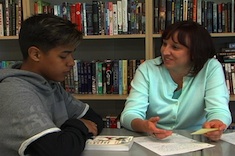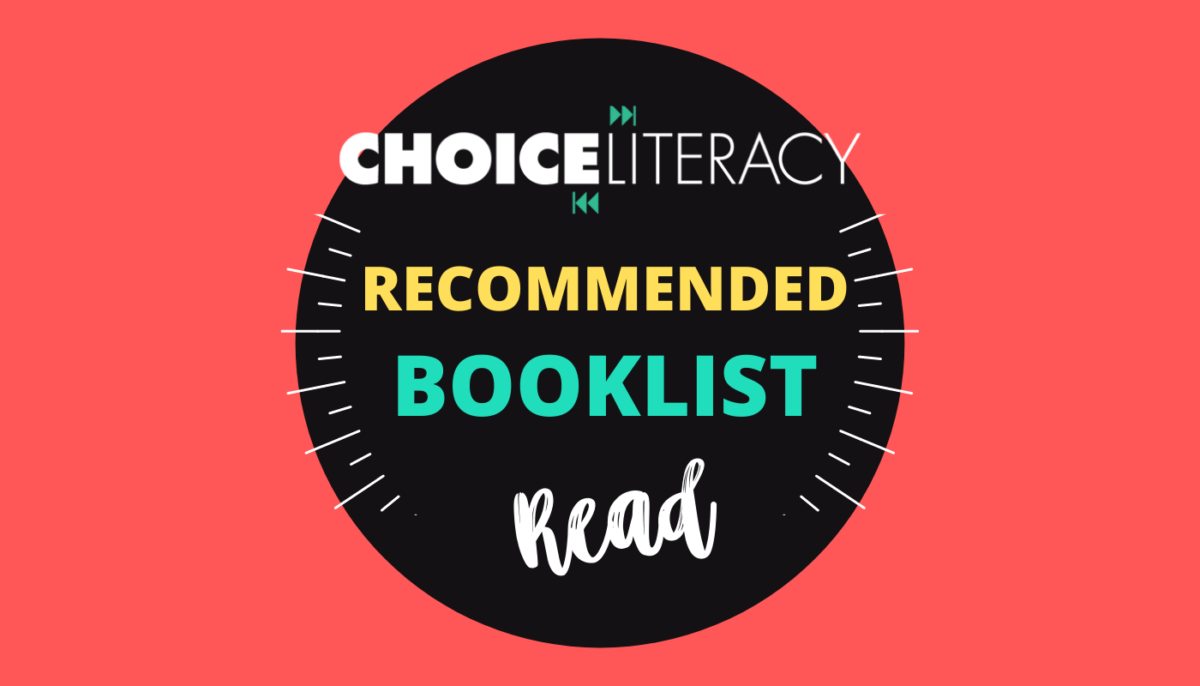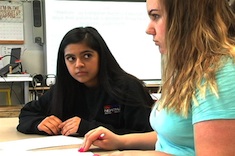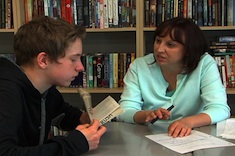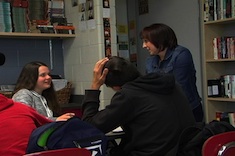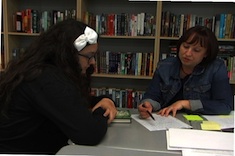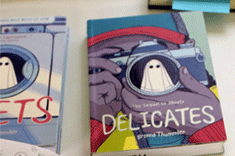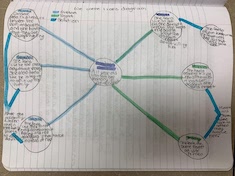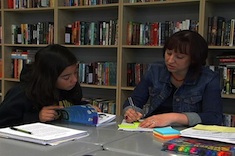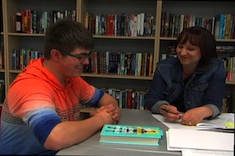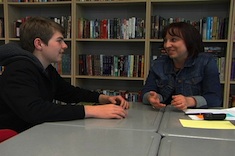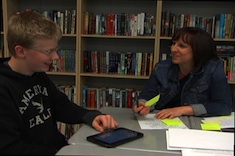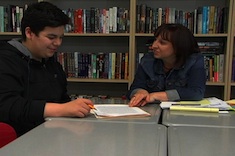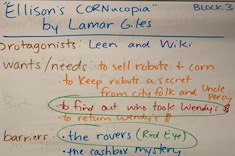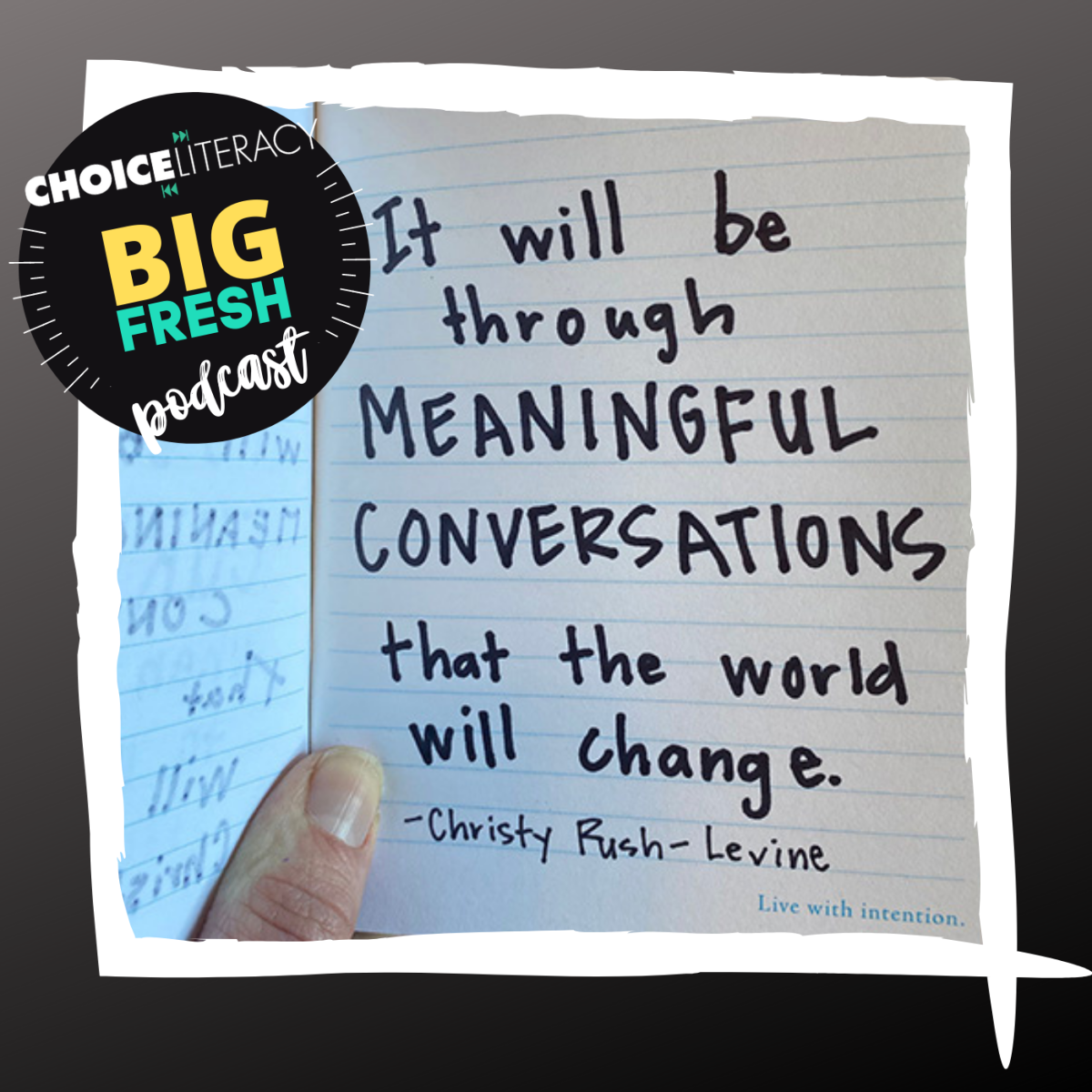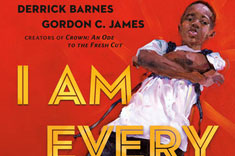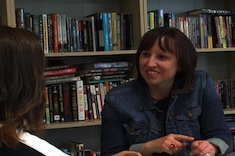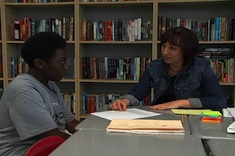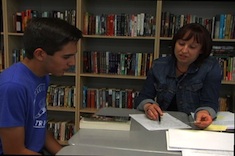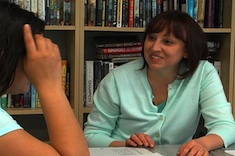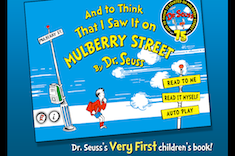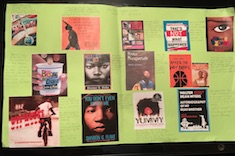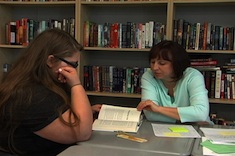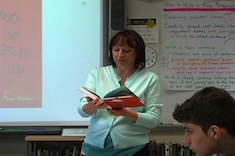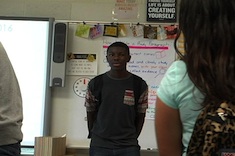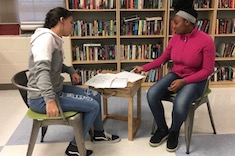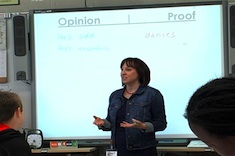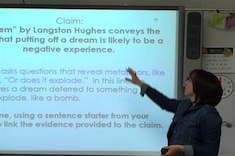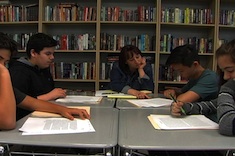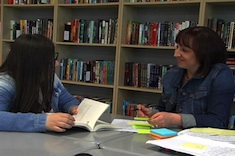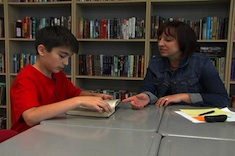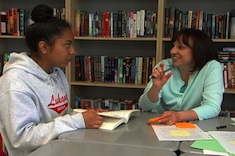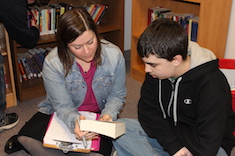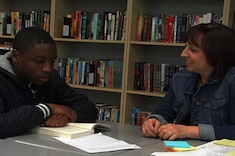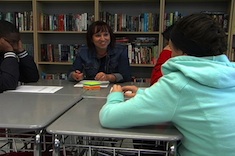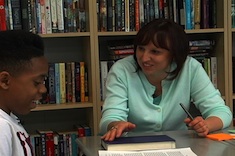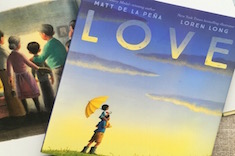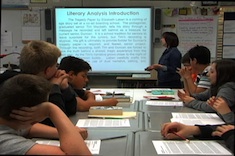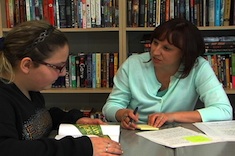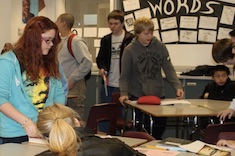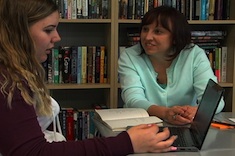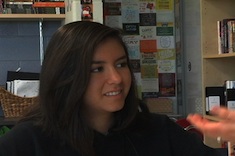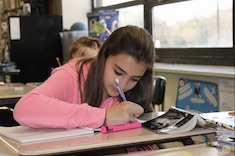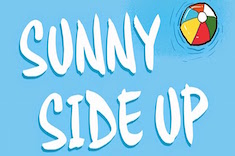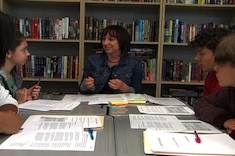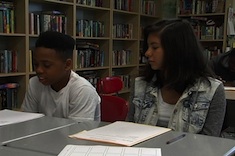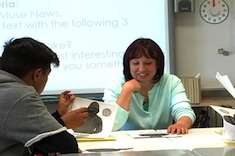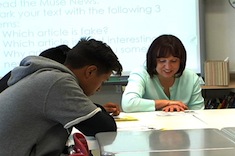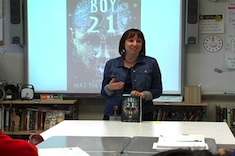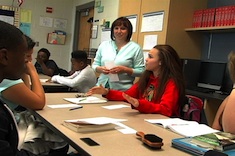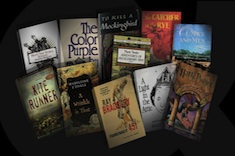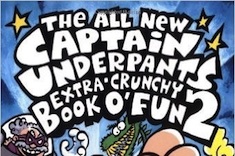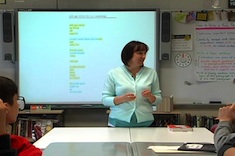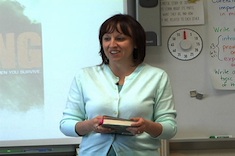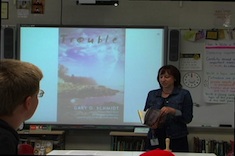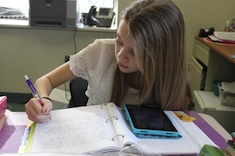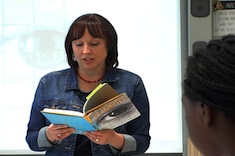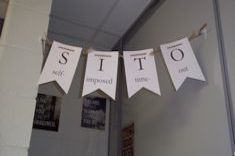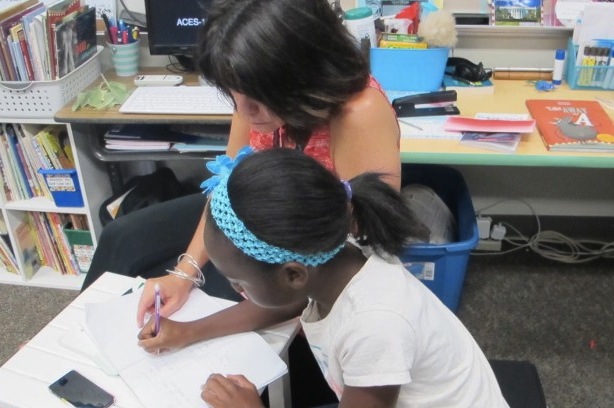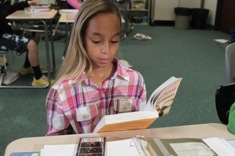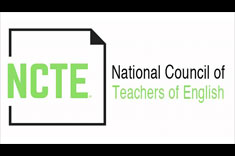Christy Rush-Levine
Christy Rush-Levine has been a middle school language arts teacher since 2000, a Choice Literacy contributor since 2014, and a college instructor since 2017. She lives and works in a suburb of Chicago. Christy blogs at interstice: not the lines; the spaces between. She can be found on Twitter (@CRushLevine) and Instagram (@rushreads and @rushcl).
Latest Content
Story Walks
Christy Rush-Levine invites students into a story walk. While many of our school activities require students to sit still and be quiet, story walks with wordless books are a simple way to invite students to move and talk, with powerful outcomes.
One-Page Reading Response: A Simple Approach to Complex Assessment
Christy Rush-Levine uses one-page reading responses as a simple culminating activity to provide closure for book clubs. However, the data they offer about readers is far from simple.
Anthologies to Diversify Middle School Reading Instruction
Christy Rush-Levine offers a booklist of anthologies to diversify middle school reading instruction. In this robust list, everyone will find a new addition to use as a whole-class text.
Conferring and Peer Support
Christy Rush-Levine connects students to support each other as they write their literary analysis essays.
Stay Sharp: Christy Rush-Levine
Christy Rush-Levine shares tips on how teachers can stay sharp.
Reading Threads
Christy Rush-Levine guides us to make reading recommendations based on what students enjoy most about a book they recently read. Christy used to make recommendations based on the genre or topic, but she has learned to listen to students to discover the reason they loved a recent read and use this information for recommendations.
The Choice Literacy Book Club Discusses Apple and Magnolia
The Choice Literacy Book Club discusses Apple and Magnolia.
Circulating During Writing Workshop
Christy Rush-Levine circulates for quick conferences as students complete their literary analysis essays.
Conferring Over Character Motivation
Christy Rush-Levine confers with Erica about her reading response to 13th Reality. She helps Erica consider character motivation.
Quick Take: Using Mailboxes for Private Feedback
Christy Rush-Levine shares her system for streamlining passing papers and offering a place for private feedback.
What Criteria Should We Use When Selecting Whole-Class Texts?
Christy Rush-Levine reminds us that text selection affects students. By shaping a unit of study to contain texts of varying formats and representing a wide variety of characters, students are empowered to develop their own ideas even while reading a whole-class text. Download a diverse text list to deepen a discussion of how family shapes identity.
Book Talk: Sheets and Delicates by Brenna Thummler
Christy Rush-Levine pairs Brenna Thummler’s books Sheets and Delicates in a book talk for her sixth-grade class.
Presence Required
Christy Rush-Levine reminds us that it requires presence to sit alongside young readers and writers. In two examples, we find resilience for meeting students at their points of need and then teaching them as readers and writers.
Quick Take: Simple Classroom Library Organization
Christy Rush-Levine shares her simple system for organizing her massive classroom library.
A Case for Graphic Novels as “Real” Reading
Christy Rush-Levine makes a case for the robust nature of reading graphic novels. Included are two downloads: a classroom library permission slip and an initial reader’s notebook entry form.
Conferring Over Plausibility and Plot
Christy Rush-Levine confers with Logan over his reading response to Fat Boy vs. the Cheerleaders and Noggin 13th Reality. She helps him think about the plausibility of the story and what constitutes a worthy problem in literature.
Reading Conference: Sports Connections
Christy Rush-Levine confers with Carson about his connections to sports in his reading.
Conferring and Conversation
Christy Rush-Levine confers with Tim about his reading.
What Do Readers Need?
Christy Rush-Levine offers a close look into the needs of readers by considering engagement, enrichment, and nourishment. She offers three examples of reading conferences with students.
Crafting a Literary Analysis
Christy Rush-Levine helps Ezekial draft his literary analysis.
Teaching Summary
Christy Rush-Levine faces the challenge of helping her students see summary writing not as drudgery, but as a way to build more sophisticated thinking around texts.
Meaningful Conversations Podcast with Christy Rush-Levine
Christy Rush-Levine discusses meaningful conversations on the podcast.
Meaningful Conversations
Christy Rush-Levine wraps meaningful conversations about race into her curriculum instead of making it “one more thing” to squeeze into the school day.
Comparing Book and Television Adaptations in a Reading Conference
Christy Rush-Levine confers with Adriana over her response to Pretty Little Liars, considering differences between the television show and book.
Honoring Student Identity
Christy Rush-Levine considers how to communicate to all students that their presence and their identities are valued and appreciated.
Matching Evidence and Claims in Writing
Christy Rush-Levine confers with Brendan about his literary analysis and how to match evidence and claims. She has him talk through his understanding of the text, using the oral rehearsal to plan his writing.
Choice in Literacy Workshops
What makes choice authentic in literacy workshops? Christy Rush-Levine grapples with this tough question that leads to changes in her instruction.
Three Things Digital Tools Have Taught Me About Feedback
Christy Rush-Levine discovers that a move to digital feedback reveals many important truths about her middle school students, including insights into the effect of grades on how learners view response to their work.
Management and Middle School Workshops
Christy Rush-Levine lowers the tension level in her class over management issues by moving from irritation to curiosity, using her “inner chimpanzee” voice.
Lessons and Minilessons: What’s the Difference?
What’s the difference between a lesson and a minilesson? Christy Rush-Levine finds that flexibility is just as important as length in making minilessons work well.
Conferring over Motivation and Genre
Christy Rush-Levine confers with Griffin over his reading responses. They consider the differences between dystopian literature and realistic fiction, as well as what motivates characters.
Literary Analysis in Eighth Grade: Conferring
Christy Rush-Levine helps Alyssa draft her literary analysis essay.
Student Ownership of Literary Analysis
Christy Rush-Levine shares the strategies she uses to help her middle school students take ownership of their literary analysis essays.
Reading Conference: Connections to Home
In this conference in Christy Rush-Levine’s eighth-grade classroom, Jaden is reading a book that mixes math with basketball, an activity he enjoys at home.
Creating a Safe Space in Middle School
Christy Rush-Levine ponders what it means to create a safe space for all of her middle school students, and then makes some changes.
Exploring Author’s Craft in Graphic Novels
Christy Rush-Levine finds her middle school students need more support and scaffolds to understand authors’ craft in graphic novels.
Characters, Choices, and Graphic Novels: Eighth-Grade Reading Conference
Christy Rush-Levine confers with Nia over the graphic novel she is reading. They discuss the choices characters make.
Scaffolding Instruction in an Author Study
Christy Rush-Levine scaffolds her middle-school students’ understanding of craft moves by moving from short stories to novels when studying specific authors.
Textual Lineage
Christy Rush-Levine uses book covers to help her middle-school students explore their histories (or “lineages”) as readers.
Building Reading Skills Book to Book: Conferring with Bridget
Christy Rush-Levine confers with eighth grader Bridget, coaxing her to compare and contrast the reading experience and plot twists in books.
Back-Channel Conversations During Read Alouds
Christy Rush-Levine considers some of the “underground” ways in which she converses about books at conferences and on social media, and decides to set up a back channel for similar conversations about read alouds in her classroom.
Voices Mantra
Christy Rush-Levine’s eighth graders lead their classmates in a “voices” mantra. This shared chant created together starts each class with a sense of community and strength.
Who Owns the Learning?
An enthusiastic student response to an author visit inspires Christy Rush Levine to revamp her upcoming unit on craft moves to foster more student ownership.
Think Small
Christy Rush-Levine realized she had to help her students find a different “why” for their time in her classroom and school beyond test scores and standards dictates.
Opinion Proof Lesson
Christy Rush-Levine helps her students create an “opinion proof chart” in their notebooks. This exercise helps them build their skills in backing up opinions with evidence.
Revising Literary Analysis Essays: Supporting Claims
Christy Rush-Levine presents a minilesson to her eighth-grade students about revising their literary analysis essays, using an analogy about putting furniture together.
The Magic That Might Go Down
Christy Rush-Levine decides to slow down in her classroom and engage more fully with a student who is a wiseacre and resistant reader. What happens next can only be described as magic.
Reset
Christy Rush-Levine finds her students sometimes need to stop and be challenged to think in more positive ways about their reading abilities. She describes how she designs minilessons for impromptu resets in her middle school classroom.
Poetry Connections
Poetry writing always has the potential to spark some magic in students. Christy Rush-Levine finds this magic requires a few conditions to be in place first in her middle school classroom.
Evidence Claims in a Middle School Small Group
Christy Ruth-Levine leads a small group of eighth graders as they explore how to include textual evidence in their literary analysis essays.
Cause and Effect: Conferring with Olivia
Christy Rush-Levine confers with Olivia about the principle of cause and effect in the novel she is reading.
Four-Step Reading Conferences
Christy Rush-Levine emphasizes “reflaction” in her reading conference protocol—reflection that leads to action for her students. Download the Reflaction (reflection + action) Form to use with students.
History Through a Child’s Eyes: Conferring with Omar
Christy Rush-Levine confers with Omar, who is reading The Rock and the River. The book is a fictional account of a tumultuous time in civil rights history, considering protests through a child’s eyes.
Reading Conference: Keeping Track of Characters
Christy Ruth-Levine confers with Edith, who is tracking character changes in the novel Room.
Reader Response as an Entry to Conferring
Christy Rush-Levine integrates reading responses into her preparation for reading conferences, and then uses the responses as a tool to build goals and insights within the conference.
How to Get Books Off Shelves
Christy Rush-Levine writes about the push and pull of wanting to put books into students’ hands, and needing at the same time to give them room to explore the classroom library.
Seeking Personal Relevance
Christy Rush-Levine has to figure out how to engage a class of students that is compliant and dutiful, but shows little passion for reading and writing.
Splashing Around to Find Themes
Christy Rush-Levine moves from emphasizing theme to teaching strategies for understanding text, and finds it’s a much better way to get her eighth graders to grapple with theme in natural, organic ways.
From Title to Theme: Conferring with Jadev
Christy Rush-Levine confers with Jadev about how the title of a book often gives clues to its theme.
Understanding War: Conferring with Cam
Christy Rush-Levine confers with Cam, an eighth grader who seeks to understand the complexity of war through the experiences of main characters in novels.
Using a Storyboard for Reflection and Comprehension
Christy Rush-Levine shows a group of three students how they can use a storyboard to help track thinking while reading.
More Scholarly Discussions in Middle School
“Eat my shorts!” Christy Rush-Levine overhears a student comment in a literature group, and begins a quest to teach her students strategies for more appropriate and thoughtful conversations around texts.
Peer Support in Writing Workshop: Conferring with Jaden
Christy Rush-Levine meets with eighth grader Jaden, who talks through his struggles in writing a conclusion to his literary analysis, and how his peers helped him improve the writing.
Leveraging Read Aloud
Christy Rush-Levine finds that administrators are questioning the value of read alouds, especially with older students. She shares how she uses the picture book Love in her middle school classroom to launch challenging discussions about timely themes.
The Importance of Context Minilesson
Christy Rush-Levine uses a vivid anecdote from her youth to teach her middle school students about the importance of context in literary analysis.
Close Attention and Reading Response: Conferring with Tori
Christy Rush-Levine confers with eighth grader Tori about her reading response to Why We Broke Up. She encourages Tori to make connections between the characters in her current book and her previous reading by paying close attention to surprising action.
Revising Thinking Through Multiple Readings
We’ve all had that student — the one who blurts out a misreading of a text, only to have classmates agree with the analysis. Christy Rush-Levine explains how she uses “first-, second-, and third-draft readings” to help her middle school students develop stronger comprehension skills.
Flash Forward with New Students
The dark days of winter may be the best time to plan for spring step-up events to introduce students to next year's teachers. Christy Rush-Levine has a new goal of using the day to promote summer reading.
Teaching Revision in Middle School
Christy Rush-Levine finds her middle school students are adept at planning for writing with notes and visuals, but rarely revise their drafts. She develops a minilesson sequence to help them hone their revision skills.
Writing a Strong Conclusion to a Literary Analysis Essay
Christy Rush-Levine helps eighth grader Katherine sort through tools and strategies for writing a strong conclusion to her literary analysis essay.
Assessment Refresh
Christy Rush-Levine considers how her rubrics do not acknowledge different levels of support some students need to accomplish tasks. She rethinks her rubric design to include support, and in the process fosters more independence and reflection in students. Download the assessment rubric.
Eighth-Grade Conference: Empathetic Reading
Christy Rush-Levine confers with eighth grader Julian about his strengths as an empathetic reader.
Push Pause: Dealing with Failure in the Midst
Christy Rush-Levine discovers it’s important to “push pause” to deal with failure in the midst of teaching.
Building Community with a Shared Text
Christy Rush-Levine finds a community of new teachers bonds over a text highlighting addiction struggles. The experience leads her to think through what elements are essential for whole-class texts in her middle school classroom.
Expert Students
Christy Rush-Levine uses a quick assessment during writing workshop conferences to connect expert students with peers who might need assistance. She includes a video example of the practice.
Literary Analysis: Tone and Scholarly Writing
Christy Rush-Levine shares how to help student writers understand and develop a scholarly tone. The feature includes a video example of small-group instruction.
Literary Analysis: Counterclaims
Christy Rush-Levine shares how to present counterclaims, as well as a video example of a small group exploring counterclaims.
Using If I Stay to Model Literary Analysis
Christy Rush-Levine uses the mentor text If I Stay to model literary analysis, building on her middle school students’ interest in the recent movie.
“Old Age Sticks”: Choral Reading and Reflection
Christy Rush-Levine leads her eighth graders in a choral reading and analysis of the E. E. Cummings poem "Old Age Sticks." This is the second video in a two-part series.
Fact or Fiction? Introducing the Task
Christy Rush-Levine has her middle school students complete a fun and sophisticated reading activity using Muse magazine to sort through what might be fact or fiction. The piece includes a video excerpt from the group discussion.
Fact or Fiction? Discussion
Christy Rush-Levine has her middle school students complete a fun and sophisticated reading activity using Muse magazine to sort through what might be fact or fiction. In this second installment of the video series, students discuss the articles they have read.
Book Talk: Boy21
Christy Rush-Levine piques interest in Boy21 through a book talk to her middle school students.
“Old Age Sticks”: Poetry Analysis in Eighth Grade
Christy Rush-Levine leads her middle school students in a choral reading and analysis of “Old Age Sticks” by E. E. Cummings. This is the first installment in a two-part series.
Beyond the Comfort Zone: Books for Our Times
Christy Rush-Levine explains why she stocks some books in her middle school classroom library that can provoke concerns from families, and how she deals with conflicts.
Critical Thinking and Captain Underpants
Christy Rush-Levine and some struggling eighth-grade readers consider misogyny in a popular children’s book.
Superpowers and a Middle School Classroom Library
Christy Rush-Levine explains how she gradually stocked her middle school classroom library, as well as how she uses student librarians to ensure books aren’t lost.
Reflective Transitions
Christy Rush-Levine helps her eighth-grade students launch the work period with a reflective question that sets a tone for productivity, and then returns to it throughout the morning during transition times.
The Living: Book Talk
Christy Rush-Levine introduces The Living to her eighth graders.
Book Talk: Trouble
Christy Rush-Levine previews the book Trouble by Gary D. Schmidt.
Last Chance Workshop
Christy Rush-Levine breaks her routine of responding to student writing, and instead calls on students to guide and support peers. She shares some surprising results.
Book Talk: When We Broke Up
Christy Rush-Levine piques the interest of her eighth graders in When We Broke Up by Daniel Handler.
A Formula for Great Book Talks
Christy Rush-Levine explains her formula for successful book talks in middle school that grab students' attention. We've also included a sample book talk.
Deep Reading of Picture Books in Middle School
Christy Rush-Levine shows the power of using picture books with young adolescents to model close reading and deepen comprehension of sophisticated texts.
SITO: Self-Imposed Time-Out
Christy Rush-Levine takes an oddly shaped unused nook in her classroom and turns it into a charming space where students can choose to take a quiet break with a “Self-Imposed Time-Out” (SITO).
Literary Analysis and Authenticity in Middle School
Christy Rush-Levine finds the best way to help her middle school students learn to read closely for literary analysis is through student writing. They begin with analyzing student exemplars from the Common Core, and then move to shared texts as they hone their skills.
Embracing Standards in Creative Ways
Christy Rush-Levine makes links between standards, video clips, and close reading.
Data That Matters
What information is gathered by a teacher sitting in a rocking chair quietly watching her students? Christy Rush-Levine discovers it is plenty.
Just Reading?
Christy Rush-Levine challenges the notion that there is anything easy or natural about getting young teens to select and read books independently in classrooms.
The Beginnings of a Middle School Literacy Community
What do you do on day one? Christy Rush-Levine describes the routines in her middle school classroom.
Student Learning Targets
Christy Rush-Levine finds she has to rethink learning targets for her middle school students if she wants students to pursue complex and lifelong reading goals.
The Weight of Stories
Some of our students lead such hard lives. Christy Rush-Levine explores how teachers can keep from being dragged into the undertow of the most difficult situations children face.
Close Reading and Multiple Layers in Middle School
Christy Rush-Levine uses striking texts that inspire multiple readings by her middle school students.
First Shared Text: Fishing for Many Meanings with Adolescents
Christy Rush-Levine introduces her middle school students to the complexity of reading on the first day of school.
Quick Take: Special Library Shelves
Christy Rush-Levine shares a few special shelves in her classroom library.
Choice in Assessment
Christy Rush-Levine explores the way a shift in assessment questions can give students ownership of their thinking and responsibility for developing meaning from a text.
Browse Content By
Type
Category
- Assessment Tools
- Big Fresh Archives
- Booklists
- Choice Numeracy
- Classroom Design
- Common Core
- Community Building
- Conferring
- Content Literacy
- Digital Literacy
- English Language Learners
- Equity
- Family Relations
- Free Samples
- Guiding Groups
- Leadership
- Literacy Coaches
- Mentor Texts
- Minilessons
- New Teacher Mentors
- Podcasts
- Poetry
- Quote Collections
- Reading Strategies
- Self Care
- Struggling and Striving Learners
- Talking and Listening
- Teacher Study Groups
- Teaching Reading
- Teaching Writing
- Word Study and Vocabulary
Author
- Melissa Quimby
- Nawal Qarooni
- Gwen Blumberg
- Julie Cox
- The Lead Learners
- Hannah Tills
- Josie Stewart
- Ruth Metcalfe
- Mallory Messenger
- Becca Burk
- Jodie Bailey
- Vivian Chen
- Mary Brower
- Tiffany Abbott Fuller
- Stephanie Affinito
- Ruth Ayres
- Leigh Anne Eck
- Heather Fisher
- Shari Frost
- Julie Johnson
- Suzy Kaback
- Gigi McAllister
- Shirl McPhillips
- Melanie Meehan
- Cathy Mere
- Debbie Miller
- Tara Barnett and Kate Mills
- Tammy Mulligan
- Dana Murphy
- Bitsy Parks
- David Pittman
- Brenda Power
- Heather Rader
- Matt Renwick
- Mandy Robek
- Christy Rush-Levine
- Gretchen Schroeder
- Jen Schwanke
- Brian Sepe
- Katherine Sokolowski
- Stella Villalba
- Jennifer Vincent
Grade Level
Choice Literacy Membership
Articles
Get full access to all Choice Literacy article content
Videos
Get full access to all Choice Literacy video content
Courses
Access Choice Literacy course curriculum and training


